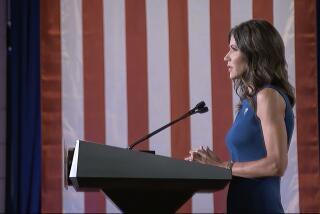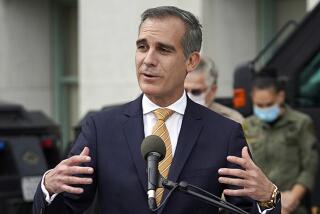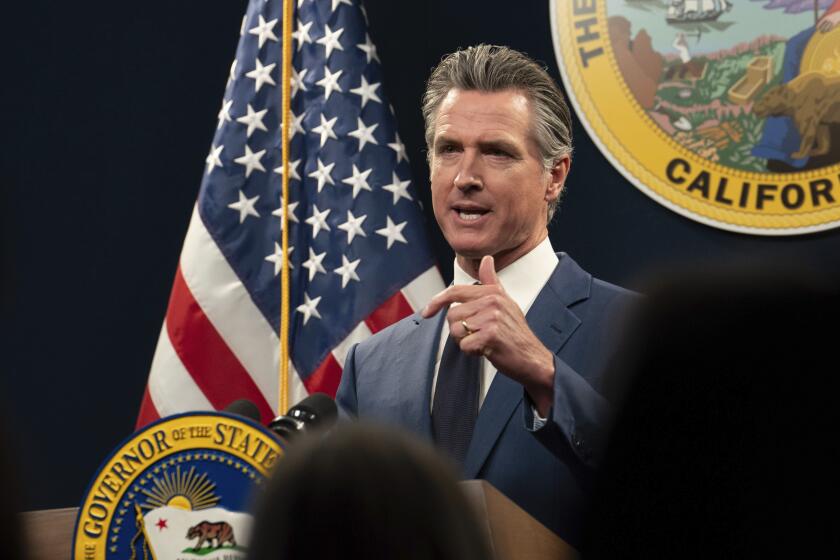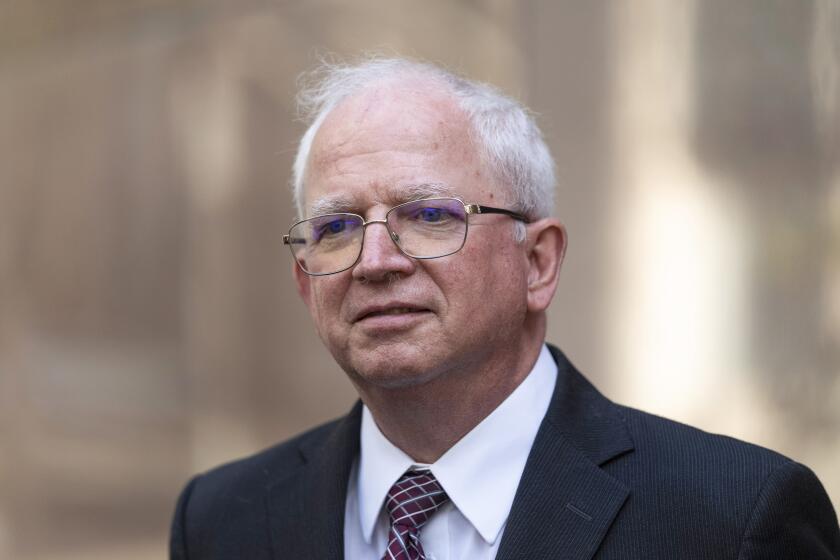His News Will Be Fit to Print, Says Riordan
At 72, Richard Riordan still sends guys half his age home with bruises from the Saturday-morning basketball games he plays at Venice Beach.
Now the former L.A. mayor would like to bloody The Times’ nose by starting a newspaper “that wants its readers to fall in love with Los Angeles.”
“This town needs a paper that has an intellectually honest perspective on local news and respects its readers,” said Riordan, who unsuccessfully sought the GOP’s nomination in last month’s gubernatorial primary and believes neither that campaign nor his mayoral administration received fair or accurate coverage from The Times. “I don’t think any paper should have a monopoly, and The Times has a death wish for Los Angeles,” he said. “It would like to see the city destroyed, and 99% of the local news it prints is negative, and that hurts the city.
“I’m not suggesting that The Times ought to engage in boosterism or dishonest reporting,” said the lawyer and venture capitalist, whose personal worth is thought to exceed $100 million. “I’m just against the paper’s intellectual dishonesty and political correctness.”
What Riordan envisions for his own paper is something modeled on the New York Observer, a blend of columns, local news, reviews and analysis. He plans to act as editor in chief and currently is meeting with candidates for the managing editor’s job, some of whom “we’ve flown in from out of town.”
According to Riordan, he is conducting “meetings every day” on the project, which he hopes to launch as a five-day-a-week broadsheet, “though it could be once or twice a week.”
“We’re going to use a lot of features by freelancers,” Riordan said. “There are so many good writers in Los Angeles, particularly in the movie industry, and many of them would work for low rates to see their stuff in print. On the economic side, we’re going to try not to have too many full-time people--probably about 40. We’ll have a lot of columns, local news, quality gossip, film history, a page on what’s good and bad on the Internet and short movie reviews that people can understand and that don’t give the plot away.”
One of the columnists Riordan already has approached is retired Times City Editor Bill Boyarsky, whose column The Spin was widely read by local politicos. However, Boyarsky, who teaches political science at USC and works at the Center for Governmental Studies there, said he was too busy to do more than contribute occasional articles.
Riordan said he will put up part of the estimated $5 million analysts say will be required to launch the new paper, though he said “several people have come to me already about investing.” (The recently launched New York Sun, a culturally and politically conservative five-day-a-week broadsheet, raised $20 million, including a substantial investment by Canadian-born financier Conrad Black.)
One name investment bankers have linked with Riordan’s project is Rupert Murdoch, whose extensive local holdings include Fox Studios and Broadcasting as well as the Dodgers. Riordan declined to discuss Murdoch or any other potential investor by name.
Asked where he would seek readers for the paper he hopes to put on newsstands by September, Riordan said he had been advised “to stand on the highest point in Pacific Palisades and to go after everybody I could see from that point.”
Pollster and political strategist Arnold Steinberg, a longtime Riordan advisor who resigned from the gubernatorial campaign over strategic differences, said, “No one should underestimate Dick. He can call upon a vast network of social and business relationships to help him succeed.... But he could hurt himself and the newspaper by dominating editorial policy. People have to feel that this newspaper will take on sacred cows. That’s tough, because Dick is so terribly well connected that good stories are likely to offend some of his friends. This cannot be a paper for Westside Hollywood liberals who don’t like The Times’ movie reviews.”
*
Vanity Press?
“Only the written word endures,” wrote the wishful Latin poet Horace.
But writers and editors know that paper is a fragile thing. Hence their frequent efforts to extend its shelf life--and profitability--by binding it between hard covers. Vanity Fair editor Graydon Carter, for example, has revived efforts to create a publishing imprint that would bear the perennially profitable Conde Nast magazine’s name but which would be distributed by an existing publishing house.
Carter already has held preliminary talks with Random House, Knopf, Nicholas Calloway, Assouline and Talk Miramax. Carter was in London this week “straightening out some problems with Vanity Fair’s British edition.” But a spokeswoman explained that the magazine’s proposed imprint envisions producing a half-dozen or so titles over four years. They would not be book-length expansions of the magazine’s feature articles but topical anthologies of articles as published, as well as photographic collections from Vanity Fair’s archives. The latter would follow the path beaten to numerous coffee tables by the magazine’s recent collection of Hollywood photos.
Carter expects to have a publishing deal by the fall and to launch the imprint sometime next year.
*
Work in Progress
Novelist, screenwriter and critic David Freeman is author of “One of Us” and “A Hollywood Education.” His screenplays include “Street Smart” and “The Border.” Freeman says:
“I’m very near the end of a book, which I now believe is going to be called ‘It’s All True.’ It’s the story of a man named--for the moment, at least--Henry Wearie, who is a screenwriter. Through his voice and experiences, the novel is a fictional history of Los Angeles and Hollywood over the last 25 years. It’s a period marked by astonishing changes in the movie business and in the city. The movie business is characterized by the change from independent production companies to the utter lunacy of the multinationals. The changes in Los Angeles are exemplified by the Farmers Market, where I, actually, and Henry, fictionally, breakfast every morning and have for many years.
“Henry, I think, reflects the great middle among Hollywood screenwriters. He had one sizable hit early on, a number of smaller successes and a great many unmade scripts since. There’s a bit of movie business salami that rings in his mind: ‘If you have a hit when you’re young, you’ll never leave.’”
More to Read
Get the L.A. Times Politics newsletter
Deeply reported insights into legislation, politics and policy from Sacramento, Washington and beyond. In your inbox three times per week.
You may occasionally receive promotional content from the Los Angeles Times.






